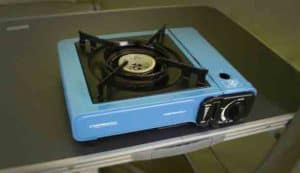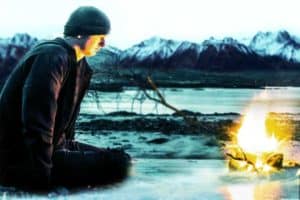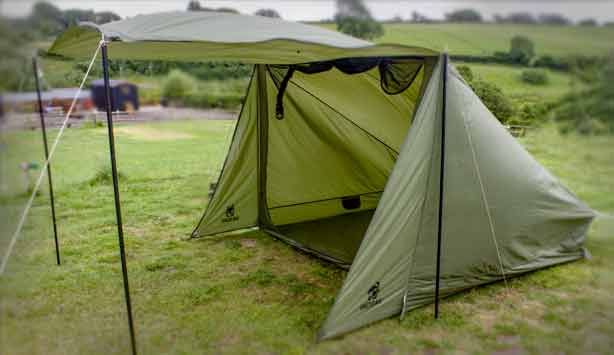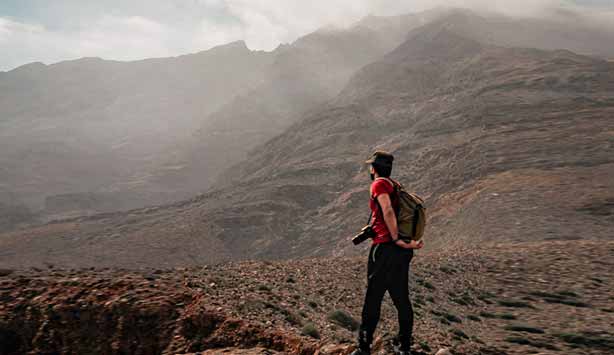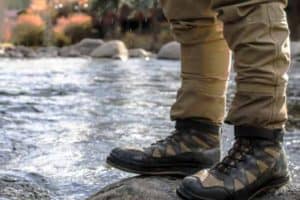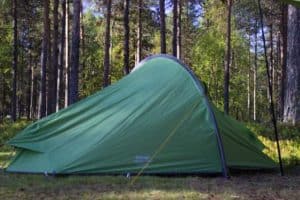This page may have Commerce Content. If you buy something from our posts, we may get a small share of the sale. Click here for more.
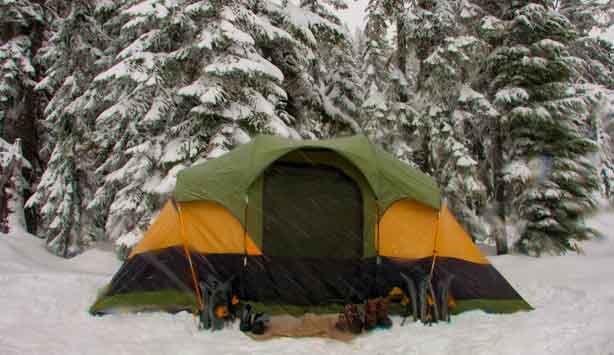

Editor & Article Writer for Outdoor Wilds
As an Amazon Associate I earn from qualifying purchases. Thank you for helping to support the site.
How to Stay Warm While Camping in Cold Weather
Winter has arrived, the mountains are covered with snow and nature provides us with beautiful landscapes that are worth immortalizing in the company of our family and friends. In this guide I take a look at how to stay warm while camping in cold weather.
What better way to live a family adventure in the middle of winter than to go camping for a weekend? Too risky? Maybe so. But the reward of living a family adventure when the forest is totally covered with snow is worth it.
Many will believe that camping on clear nights under the stars are things you can only do in the summer, but the truth is that during the winter there are also many brave adventurers who decide to camp when the weather conditions are not so favorable.
Tips For Camping in Cold Weather
The only thing that is necessary for a successful camping weekend is to carry out good planning and to be clear about what you should pack inside of your backpack so that the body does not freeze during these night frosts.
The worst part of going into the wilds when the temperatures are so low is that without the right equipment or survival techniques.
Spending a night in the middle of a snowy mountain at minus 15 degrees can become a real risk to the health of those who accompany us.
Popular Posts
Related Posts
Last update on 2024-05-05 / Affiliate links / Images from Amazon Product Advertising API
Next, for all those campers who are planning their next big adventure and want to have everything well prepared to cope with the inclement weather and any unforeseen event that may arise on the fly.
Below is a series of essential tips that will help you know what to do at all times so that your next camp is a success worth remembering.
Read on!
Check the weather forecast
It may seem a bit of obvious advice, as nowadays almost everyone has an application on their cell phone that tells them what the weather is doing and the forecast for the coming week.
However, when it comes to camping in the mountains the standard weather forecast given by some mobile apps may not be very accurate.
Contact the Park Ranger
Study in depth the area where you are going to camp, the latitude and height of the mountain and if possible contact the office of the ranger in the area to inform you about the weather expected for that day.
A ranger will be able to inform you of the type of complications that may occur depending on the area of the mountains where you are.
Carrying a reliable 2-way radio is important as this will allow you to stay in contact with the authorities when cell data signals are unreliable.
Nature is a double-edged sword, since it is something really beautiful as well as dangerous and if we do not know how to adapt to it, it may end up seriously damaging us.
Therefore, before venturing to travel to the mountain check what time it will be and if there is risk of heavy snowfall or high wind better postpone it, because too high and temperatures below zero no camper will spend a pleasant night in his tent, however well equipped it is.
Choosing the correct clothing for cold weather
Our main barrier to protection against the cold will be the clothes we wear, so you should choose carefully the clothes you’re going to wear and the fabric type of each one.
Since that’s probably the only thing that will prevent you from suffering from hypothermia or ending up with the flu when you get home.
Wear layers of clothing
Throughout the camping trip, choose a breathable fleece to wear that will keep you warm and prevent you from accumulating too much sweat.
It is also advisable to use a base layer that has thermal properties, which will keep your body totally insulated and better protected against sudden temperature changes.
If you don’t want to wear synthetic fabrics and you love clothes made of natural fibers, your best option is to wear garments made of Merino wool or wool and fleece mixtures.
Merino wool will provide you with a lot of warmth and doesn’t have to cost a fortune.
I’ve written an article dedicated to how to layer clothing for cold weather, take a look for a more in-depth guide.
Keep your head and feet warm
As for the head and feet, it is very important that you always give them extra protection from the cold. An ideal choice is a wool hat and socks that wick sweat away from your skin.
Specially designed for mountain trips are heated socks with remotes that run off batteries. These bring an extra level of warmth to your feet.
Finally, the type of boots you are going to wear don’t have to be professional or the most expensive ones in the store, just try to make them comfortable and waterproof, because if you are going to cross snowy trails you will need your feet to stay as dry as possible so you don’t end up freezing.
Hands protected from the cold
Your hands are your main tool when you are on a trip, without them you can’t continue to climb or prepare the tent.
It is very important that you always keep your fingers warm and protected from low temperatures with the help of good insulating polyester gloves.
I have delved deep into the subject of keeping hands warm in cold weather in my article dedicated to the art of warm hands.
Choose the right place to camp
If you’re planning a camping trip in the month of July, everyone looks for an isolated place with plenty of shaded areas for most of the day so as to avoid the heat.
Now, what kind of place should you look for when you are going to a snowy mountain with temperatures close to 15 degrees below zero on average?
Usually a place that receives the most sunlight at dawn, that is not too high and that allows you protection from wind gusts.
Cold weather stove
There are many types of hiking stoves on the market. When it comes to using a stove in low temperature conditions you’ll need one that can handle these extreme temperatures.
A dedicated cold weather backpacking stove is a must. Gas canister stoves struggle in low temperatures. I have written an article on cold weather backpacking stoves on this subject in more detail.
Fire lighting methods
Carrying at least 2 reliable forms of fire lighting is arguably the most essential piece of kit to have with you in cold weather camping.
There are a whole load of different types of stove lighting methods available on the market. From survival matches to ferro rods.
You’re going to need to be able to get your camping stove up and running to provide warm drinks and hot dehydrated meals throughout the day.
Don’t forget to keep yourself hydrated
It is common to think that when it’s cold staying hydrated is less important, as dehydration is much less of an issue compared to the middle of summer.
However, it is just as important and staying well hydrated throughout a camping trip. This will protect you from the cold and keep energy levels up.
Choose the right sleep system
4 season sleeping bags are ones to go for. They are temperature rated below minus 5 degrees.
Mummy shaped bags have hoods that leave just your face exposed to the air, so make a good choice for cold weather.
I usually go for a down insulation as this provides the best insulation when it gets really cold out there.
If your camping in lesser cold temperatures in late autumn then a cold weather camping blanket that is rated for sust use is an alternative to a sleeping bag.
A blanket also gives you extra space if your a sleeper who likes to move around during the night.
Tent heater for car camping
If you’re car camping then a tent heater is an option to keep warm in the colder months.
You can soon heat up a medium sized tent fairly quickly to raise your body temperature when coming back from a day hike.
There’s a tonne of tent heater options to go with. Some run off propane and others are powered via mains electric. Check out my tent heater for cold weather camping artcile for more information.
Final Thoughts
These are some of the basic tips that any camper, whether experienced or not, should put into practice so that their next camping adventure through the snowy mountains is a success.
A note on prolonging the battery life on your smartphone in cold weather. A phone is still an essential part of your kit and having enough charge in the battery is important. Read my guide on how to protect your phone from low temperatures to find out more.
If you don’t follow the basics, setbacks may become a more serious issue. Put all these tips into practice and your next camping trip will be worth remembering. Enjoy it!
Popular Posts

